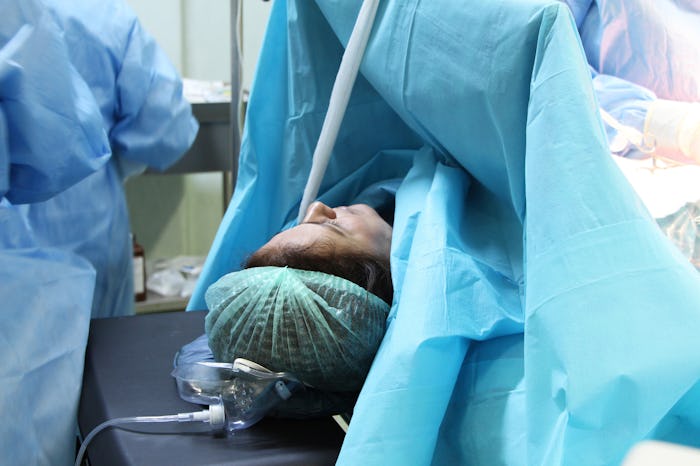Life

Here's How Having A C-Section Affects Your Body Later In Life
It sounds scary, but a C-section, a surgical birth consisting of incisions in the mother's abdominal area and uterus in order to deliver the baby, is pretty common these days. Some C-sections are pre-planned because of an issue with the mother's health or the baby, such as breech position, but C-sections can also be performed in emergency situations or because of labor's failure to progress. Whether scheduled or spontaneous, recovering from a C-section is different — and longer — than from a vaginal birth. So you should be aware of how having a C-section affects your body later in life as it can impact future pregnancies and other aspects of your physical health.
For starters, if you plan to have more children after a C-section, you could experience issues with the placenta in future pregnancies. It may also be necessary for future babies to be delivered via a C-section, although Vaginal Birth After Cesarean (VBAC) is an option for some women, noted Mayo Clinic. Whether or not you are a good candidate for a VBAC depends on a number of factors, including whether the surgical incision made to your abdomen was horizontal or vertical. (A horizontal cut heals easier and is more promising for future vaginal deliveries.) Talk to your doctor or midwife if you are interested in having a VBAC.
Besides future pregnancies, a recent study published in JAMA Surgery also finds a link between C-sections and complications following a hysterectomy later in life. "Women having a previous cesarean delivery are more likely to require re-operation and experience surgical complications after undergoing a benign hysterectomy compared with women having a previous vaginal birth," the study reported. It's important to emphasize that the study does not suggest that a C-section leads to the need for a later hysterectomy, but that if the need for a hysterectomy arises, a previous C-section could make recovery from a hysterectomy more difficult. The study's authors recommended preventing C-sections that are not medically necessary, which is another important distinction. A medically necessary C-section could be the difference between saving the mother's or baby's life — or not.
A 1996 study published in American Journal of Obstretics and Gynecology explored the long-term effects of C-sections on three specific future outcomes: ectopic pregnancy, placenta previa, and abruptio placentae. The authors concluded that "Cesarean section is a modest risk factor for ectopic pregnancy and an important risk factor for placental problems." If you're wondering, placenta previa is a condition in which your cervix is partially or completely covered by the baby's placenta. It causes bleeding throughout a pregnancy and necessitates a C-section delivery unless it resolves on its own. Abruptio placentae is "the premature separation of the placenta from the uterus," as defined by Medscape. It also causes bleeding, particularly in the third trimester, and may also trigger contractions and fetal distress.
In addition to these long-term effects of C-sections, you should also be aware of what you may experience in the days and weeks following your C-section. Although nearly one in three babies born are delivered by C-section, it is still considered major surgery. During your recovery you may experience a lot of bleeding, issues with your bladder or bowel (the two organs near your uterus), or infection, according to WebMD. Even if nothing goes wrong, recovery still takes longer. Women who have C-sections usually stay in the hospital twice as long as women who have a vaginal birth, the earlier Mayo Clinic article noted. You may need to take painkillers for discomfort and pain at the incision site. And once you get home, you'll need a lot of help for the first few weeks when you can't drive or lift anything heavier than your baby.
Overall, a medically necessary C-section is a lifesaving advance in medicine that we are all grateful to have available to us. However, research on the long-term effects of C-sections suggests that women should do research and talk to their doctor about their birth plans. Every mother and pregnancy is different, so talk to your healthcare provider about the pros and cons for you.
Check out Romper's new video series, Romper's Doula Diaries:
Watch full episodes of Romper's Doula Diaries on Facebook Watch.